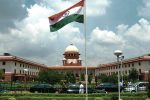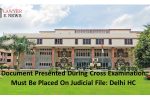Misinterpretation of Appellate Court’s Judgment Overturned; Supreme Court Affirms Joint Family Business Existence from Inception, Not Merely Post-1991: SC

The Supreme Court in its recent judgment, overturned the High Court’s misinterpretation of facts in a family property partition dispute. The crux of the case revolved around whether the properties and the garage business were part of a joint Hindu family.
Facts and Issues: The case initiated by Vitthalrao Marotirao Navkhare concerned the partition and possession of properties, including agricultural lands and business ventures, against the descendants of his deceased brother, Laxmanrao. The Trial Court had recognized only agricultural land as joint property, considering other properties and the business as Laxmanrao’s self-acquisitions. This was reversed by the Appellate Court, and the High Court initially upheld this but later reviewed to exclude certain properties, based on the misunderstanding that the joint business started only post-1991.
Detailed Court Assessment:
Joint Family Business: Evidence indicated that the garage business named ‘Gajanan Automobiles’ and ‘Trimurti Auto Garage’ was a joint family business. The Supreme Court found strong evidence supporting this, contrary to the High Court’s observation that the business became joint only in 1991.
Misinterpretation of Appellate Court Judgment: The Supreme Court noted the High Court’s erroneous interpretation regarding the commencement of the joint family business, leading to an incorrect review decision.
Affidavit of Laxmanrao: The affidavit by Laxmanrao in his lifetime played a crucial role. It was stated under oath that the garage business was a joint family business, which was binding on his successors.
Property and Business Analysis: The Court found that properties where the business was run were purchased in individual names but were used for the joint business, indicating a collective family venture from the start.
Relevance under Indian Evidence Act: The Court referred to Section 32(3) of the Indian Evidence Act, 1872, underscoring the relevance of statements against proprietary interest made by a deceased person.
Judgment: The Supreme Court upheld the Appellate Court’s decision, decreeing partition and separate possession in favor of the plaintiff, and dismissed the High Court’s review order based on incorrect factual analysis.
Date of Decision: 8th April 2024
Vitthalrao Marotirao Navkhare vs Nanibai (Dead) through LRs and others






